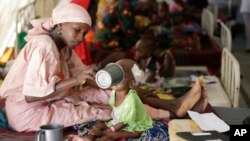The United Nations is warning that more than 1.4 million people in northeastern Nigeria could face famine by September because of a severe funding shortage. To date, only 28 percent of the U.N. appeal for more than $1 billion to provide humanitarian aid for nearly seven million people has been received.
Since Boko Haram militants began their armed rebellion against the government of Nigeria in 2009, the United Nations estimates more than 20,000 people have been killed, nearly two million are internally displaced inside the country, and about 200,000 have taken refuge in neighboring Cameroon, Chad and Niger.
Government forces have recaptured much of the territory held by Boko Haram, but the security situation remains fragile.
The U.N. humanitarian coordinator in Nigeria, Edward Kallon, says food is in short supply and traditional coping measures have been exhausted.
"Although the humanitarian response has increased substantially, we have not turned the corner yet," he said. "If the funding situation is not sustained, the situation can easily relapse into a famine situation."
Kallon says 43,000 people already are in a state of famine.
Nigeria has entered the so-called lean season when food stocks are at their lowest. U.N. estimates indicate 2.8 million people will be in urgent need of food between June and September. This is also the rainy season, a period when disease outbreaks are expected.
The situation means some of the 450,000 severely malnourished children could die, according to Deputy Humanitarian Coordinator in Nigeria Peter Lundberg.
"If they die, they will most likely die from disease that could be easily prevented if their immune system had been much stronger," Lundberg told VOA. "So, what we will see is that people will die from diarrhea disease or malaria or anything else that they normally would be able to survive if they were in a much better nutritional condition."
The United Nations says people in northeastern Nigeria also are living through a protection crisis. It says thousands are victims of sexual violence and exploitation. According to government statistics, tens of thousands of children and women have been used by Boko Haram, some as suicide bombers.




